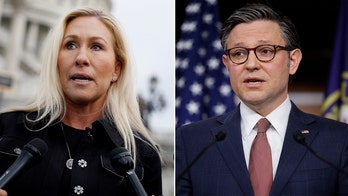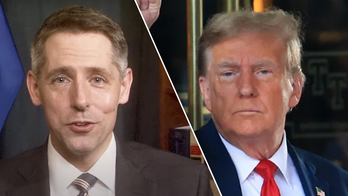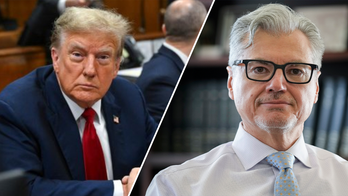House Minority Leader John Boehner on Wednesday accused Democrats of hypocrisy in calling for truth commissions into whether the Bush administration condoned torture, as a Senate panel weighed whether Justice Department lawyers permitted torture against terror detainees.
Boehner slammed House Speaker Nancy Pelosi for not being open about her briefings on interrogations of terror suspects. Pelosi was told in February 2003 that waterboarding was used on CIA terror detainee Abu Zubaydah, but did not object because she was not personally briefed on the matter, an unnamed source told CNN on Tuesday.
Pelosi said she did support a letter drafted by Rep. Jane Harman of California, the ranking Democrat on the House Intelligence Committee, who raised concerns over the use of such techniques.
Pelosi said last month that several House committees are examining whether to launch investigations into Bush administration officials who wrote the legal memos allowing the use of waterboarding and other "enhanced" techniques.
"I think at the end of the day, we just ought to know, what did she know, when did she know it and what did she do about it. You can't have your cake and eat it too. And it appears that is what the speaker is attempting to do," Boehner said.
Over in the Senate, Sen. Lindsey Graham, R-S.C., questioned the purpose of the hearing in the Judiciary Subcommittee on Administrative Oversight and the Courts.
"I don't know whether this is actually pursuing the nobility of the law or a political stunt. We'll let the American people decide," Graham said.
Boehner said a "truth commission" would ensnare Democrats in their efforts to implicate Bush administration officials.
"They are going to continue to talk about these truth commissions but at the end of the day, they are probably not going to get anywhere because there were dozens of Democratic members on both sides of the Capitol who were briefed on these techniques, said nary a word, and in some cases encouraged our intelligence officials go further," Boehner said
In the Senate Judiciary subcommittee, Philip Zelikow, an aide to former Secretary of State Condoleezza Rice, said he tried "from the inside" to change administration policy.
Zelikow said that in 2005 President Bush put in motion a series of internal meetings on changing the rules "because he clearly wanted his advisers to reevaluate all these issues."
Zelikow said that he worked throughout 2005 to get the Justice Department's Office of Legal Counsel to adopt standards proposed by the Sept. 11 commission that investigated the intelligence leading up to the terror attacks. The commission proposed a federal war crimes statute that would ban "cruel, inhuman and degrading" treatment of prisoners during interrogation.
"By December of '05, that battle had been won, both because of internal work, but also because of the McCain amendment" that expanded application of the Army Field Manual for military interrogators and prohibited inhumane treatment.
"It was clear that CIA and the government were going to have to accept a CID compliance analysis. Thus, by early 2006, there was no way for the administration to avoid the need to reevaluate the CIA program against a CID standard," Zelikow said.
Sen. Sheldon Whitehouse, D-R.I., who chaired the subcommittee hearing, accused the Bush administration of a legion of lies for allowing torture, but then declaring that it is something other than that.
"The truth of our country's dissent into torture is not precious. It is noxious. It is sordid. But it has also been attended by a bodyguard of lies," Whitehouse said, borrowing from a Winston Churchill quote.
"We were told that waterboarding was determined to be legal, but we're not told how badly the law was ignored, bastardized and manipulated by the Department of Justice's Office of Legal Counsel. Nor were we told how furiously government and military lawyers rejected the defective OLC opinions that were ignored. We were told we couldn't second guess the brave CIA officers who did this. And now we hear that the program was led by private contractors with a profit motive and no real interrogation experience," he said.
But Graham a JAG officer who has long spoken against waterboarding, said the technique was not illegal at the time it was used.
"Please understand that in 2001, '2, and '3, the Geneva Convention did not apply to the War on Terror, only until 2006. The war crimes statute that existed in 2001 was a joke," he said.
"We have today, I think, the best war crimes statute on the books of any nation in the world that would outlaw a grave breach of the Geneva Convention. We passed that in a bipartisan fashion. We have policies now -- the Detainee Treatment Act, the McCain amendment, and other policies -- that give our people who are fighting this war the guidance they need to make sure they understand what's in bounds and what's not, and we have a new president," Graham added.
Graham said he appreciates that President Obama is trying "to repair our image and to create rules for the road" but warned against harshly judging "those who had to make decisions we don't have to make."
As Democratic lawmakers plan more hearings, an attempt by Republicans to blunt further efforts to implicate former Bush administration officials was stymied Tuesday night when the spy agency turned down a request by Rep. Pete Hoekstra for the CIA to declassify the "notes to file" from the CIA officers who briefed members of Congress on the enhanced interrogation program.
The agency told the House Intelligence Committee that the documents "remain highly compartmented and classified."
"This decision is unbelievable -- that, even with all the exposure this program has gotten, these documents would not be released," said Hoekstra, the ranking Republican on the House Intelligence Committee.
Hoekstra said he believes the documents would provide far more detail and make clear what kind of techniques were described in the briefings, shedding more light on what Pelosi and others were told, according to contemporaneous notes from those who briefed them.
Closing Guantanamo
As the witnesses on the Senate panel debated the use of harsh methods, they also discussed whether it is wise to close the Guantanamo Bay facility.
Zelikow said that the prison is more symbol than substance and the detainees there could be maintained in prisons inside the United States.
But Robert Turner, an associated director at the Center for National Security Law at the University of Virginia School of Law, said it's a mistake to close Guantanamo.
"It's a propaganda victory for our enemies because we are saying to the world we have something to apologize for -- we're holding these people illegally, we're torturing them, which has never occurred at Gitmo and that's the exact opposite message we should be sending," Turner said.




